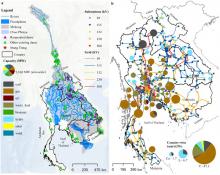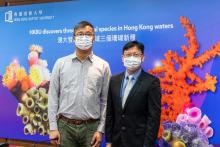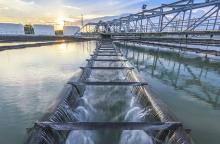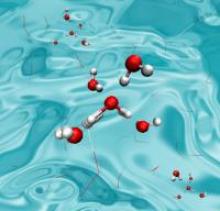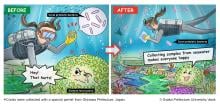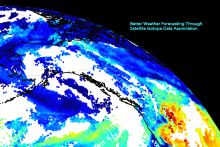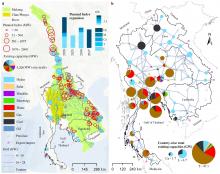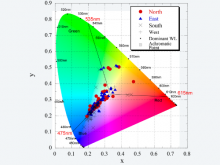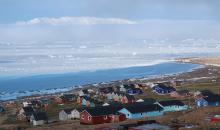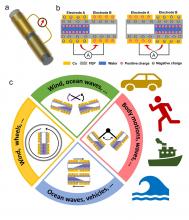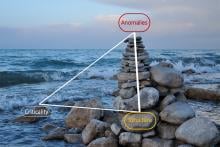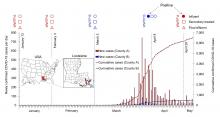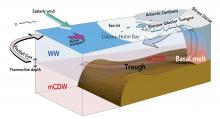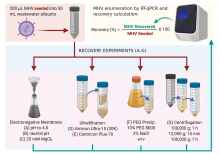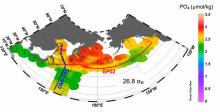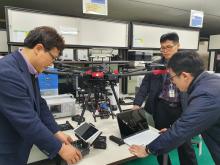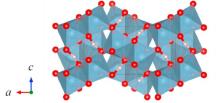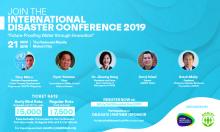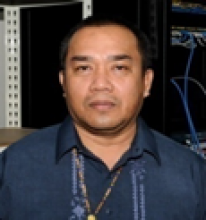Water
News
15 Jul 2022
Asia Research News monitors the latest research news in Asia. Some highlights that caught our attention this week are a robotic fish that can eat up microplastics, a bioinformatic platform that can test the efficacy of vaccines against COVID, and a new method of removing phosphorus from water using bacteria.
07 Jul 2022
Biologists from Hong Kong Baptist University (HKBU) have discovered in Hong Kong waters three new species of hard coral which have never been identified anywhere else in the world. The findings come shortly after their discovery of one new coral and two new nudibranch species, which was announced last year under their research project on coral health in Hong Kong.
17 Jun 2022
Asia Research News monitors the latest research news in Asia. Some highlights that caught our attention this week are babies that dole out punishments, signals that might come from extraterrestrial civilizations, and repelling mosquitos by chewing catnip.
09 Jun 2022
A high-level seminar-cum-networking event on Water Sustainability in Singapore was held on 21 April 2022 at Newcastle University Research & Innovation Institute Singapore (NewRIIS). The event saw the presence of representatives from Singapore's National Water agency PUB, Northumbria Water, NUCoRE Water and other organisations.
12 May 2022
Humanity is “at a crossroads” when it comes to managing drought and accelerating mitigation must be done “urgently, using every tool we can,” says a new report from the United Nations Convention to Combat Desertification (UNCCD).
21 Mar 2022
The theme of MTE 2022 is "Embracing the New Norm and Moving to New Frontiers," and this prestigious event is expected to attract over 10,000 online visitors from all over the world via its virtual exhibition platform.
02 Mar 2022
Endocrine-disrupting chemicals (EDCs), pharmaceuticals and personal care products (PPCPs) are extensively used in industrial and consumer applications. They are widely recognised as typical contaminants of emerging concern because of their environmentally persistent and bio-accumulative properties. Even in very low concentrations, they can disturb our hormonal balance, leading to reproductive impairment, abnormal development and growth retardation. Water and wastewater treatment systems worldwide face the challenge of effectively removing these contaminants.
28 Feb 2022
Scientists developed a procedure to reproduce the double peak feature of x-ray emission spectroscopy (XES) spectra in liquid water.
18 Feb 2022
Asia Research News monitors the latest research news in Asia. Some highlights that caught our attention this week are an android child, "unhackable" internet, a cancer-fighting nanoparticle from corn, and less-than-green practices by some oil companies.
16 Dec 2021
In a study published in Nature Energy this month, researchers led by Kyoto University’s Institute for Integrated Cell-Material Sciences (iCeMS) describe how nanodiamond-reinforced composite membranes can purify hydrogen from its humid mixtures, making the hydrogen generation processes vastly more efficient and cost-effective.
13 Oct 2021
Coral reefs, comprising some of the most diverse and delicate ecosystems under water, are under immense stress. From global warming to pollution to pathogens, many of the reef-building coral species are listed as threatened or endangered. But, according to researchers in Japan, the corals may have an unlikely ally: bacteria.
14 Sep 2021
Researchers from The University of Tokyo assimilated satellite observations of water vapor isotopes into a weather forecasting model and found that forecast accuracy was improved by several percentage points
12 Jul 2021
Scientists in Singapore are calling for revisions in planned hydropower expansions in light of the rapidly decreasing cost of solar photovoltaic systems
09 Jul 2021
A new study monitored satellite images to obtain sea discoloration data as a novel indicator in detecting if an underwater volcano’s eruption is imminent.
10 May 2021
A new device can light up 100 LED bulbs with a single drop of water.
13 Apr 2021
Hokkaido University researchers have clarified different causes of past glacial river floods in the far north of Greenland, and what it means for the region’s residents as the climate changes.
18 Mar 2021
A research team from the Faculty of Engineering of The Chinese University of Hong Kong (CUHK) has recently developed a water-tube-based triboelectric nanogenerator that can efficiently convert various irregular and low-frequency mechanical energies, including ocean wave energy, into electricity, providing a new avenue for the development of “blue energy”.

24 Feb 2021
Springer Nature and the University of Tokyo to hold SDGs Symposium 2021, “Interdisciplinary science solutions for food, water, climate and ecosystems Sustainable Development Goals”
29 Oct 2020
Scientists at The University of Tokyo use a two-state model based on the formation of tetrahedral structures to explain water’s anomalous properties and the surprising liquid–liquid transition of water.
26 Aug 2020
A group of scientists have detected genetic material from SARS-CoV-2 in untreated wastewater samples collected in April 2020 from two wastewater treatment plants in Louisiana, USA.
24 Aug 2020
Ice is melting at a surprisingly fast rate underneath Shirase Glacier Tongue in East Antarctica due to the continuing influx of warm seawater into the Lützow-Holm Bay.
12 Aug 2020
A group of researchers have demonstrated that, from seven methods commonly used to test for viruses in untreated wastewater, an adsorption-extraction technique can most efficiently detect SARS-CoV-2. This gives us another tool to detect the presence and spread of the COVID-19 pandemic
07 Aug 2020
A group of researchers from three Japanese universities has discovered why the western subarctic Pacific Ocean, which accounts for only 6 percent of the world’s oceans, produces an estimated 26 percent of the world’s marine resources.
27 Mar 2020
The remaining “bound water” on cotton surfaces cross-link single fibers of cotton, causing hardening after natural drying, according to a new study conducted by Kao Corporation and Hokkaido University. This provides new insight into unique water behaviors on material surfaces and helps us develop better cleaning technologies.
26 Feb 2020
Policymakers will need to step up to the challenges caused by significant shifts in fish species distributions caused by climate change.
29 Jan 2020
The technology analyzes water quality with drones and artificial intelligence to predict the level of algal bloom.
10 Dec 2019
A new hydrous phase, ε-AlOOH, was observed to be stable at pressures above ~200 GPa. The stability of ε-AlOOH at extremely high pressures may affect the modelling results of the internal structure and deep water circulation of some extra-solar planets, such as terrestrial super-Earths, because the hydroxide may store water in these regions.
14 Oct 2019
To initiate a stream of events for leaders, experts, policy-makers, and practitioners in Asia in the field of disaster and crisis management, this first series of IDC will bring a sharper focus on water.
02 Oct 2019
1st October 2019 - MITEC Kuala Lumpur, malaysia
Events
Sorry, no events coming up for this topic.
Researchers
De La Salle University
Michael Angelo B. Promentilla is a Professor of Chemical Engineering and the head of the Waste and Resource Management Unit of the Center for Engineering and Sustainable Development Research (CESDR) at De La Salle University (DLSU).
Puvadol Doydee is an Assistant Professor in the Faculty of Natural Resources and Agro-Industry at Kasetsart University Chalermphrakiat Sakon Nakhon Province Campus, Sakon Nakhon Province, Thailand.
Hokkaido University
Professor, Faculty of Environmental Science, Hokkaido University
Daegu Gyeongbuk Institute of Science and Technology (DGIST)
Prof. SU-IL IN has been working at DGIST (Daegu Gyeongbuk Institute of Science & Technology) since 2012. He served as Dean of International and External Affairs 2016 ~ 2017. He received his Ph.D. in Chemistry from University of Cambridge in 2008. Subsequently he was a postdoctoral researcher at Technical University of Denmark by 2010. Then he joined the Pennsylvania State University as a postdoctoral researcher in the Department of Chemistry before joining DGIST. Professor In’s current researches include synthesis and analysis of functional nano (bio)-materials for environmentally friendly renewable energy such as photovoltaic, heterogeneous catalysis and biocatalysts. (https://insuil.dgist.ac.kr/)
Professor and Head of Microbiology and Immunology Department,
Faculty of Medicine, Lincoln University College (LUC) Malaysia.
Professor in Agriculture and Education in the Iloilo Science and Technology University Leon Campus (ISAT U). Leon, ILOILO, PHILIPPINES
Giants in history
Sir Mokshagundam Srinivasa Shastry Vishveshwarayya (15 September 1860 – 14 April 1962) is widely regarded as India’s most outstanding engineer. In a career that spanned almost his entire life, Vishveshwarayya played a pivotal role in several engineering projects, including designing the Krishnarajasagara dam that is still the source of irrigation and drinking water for parts of Karnataka today.


